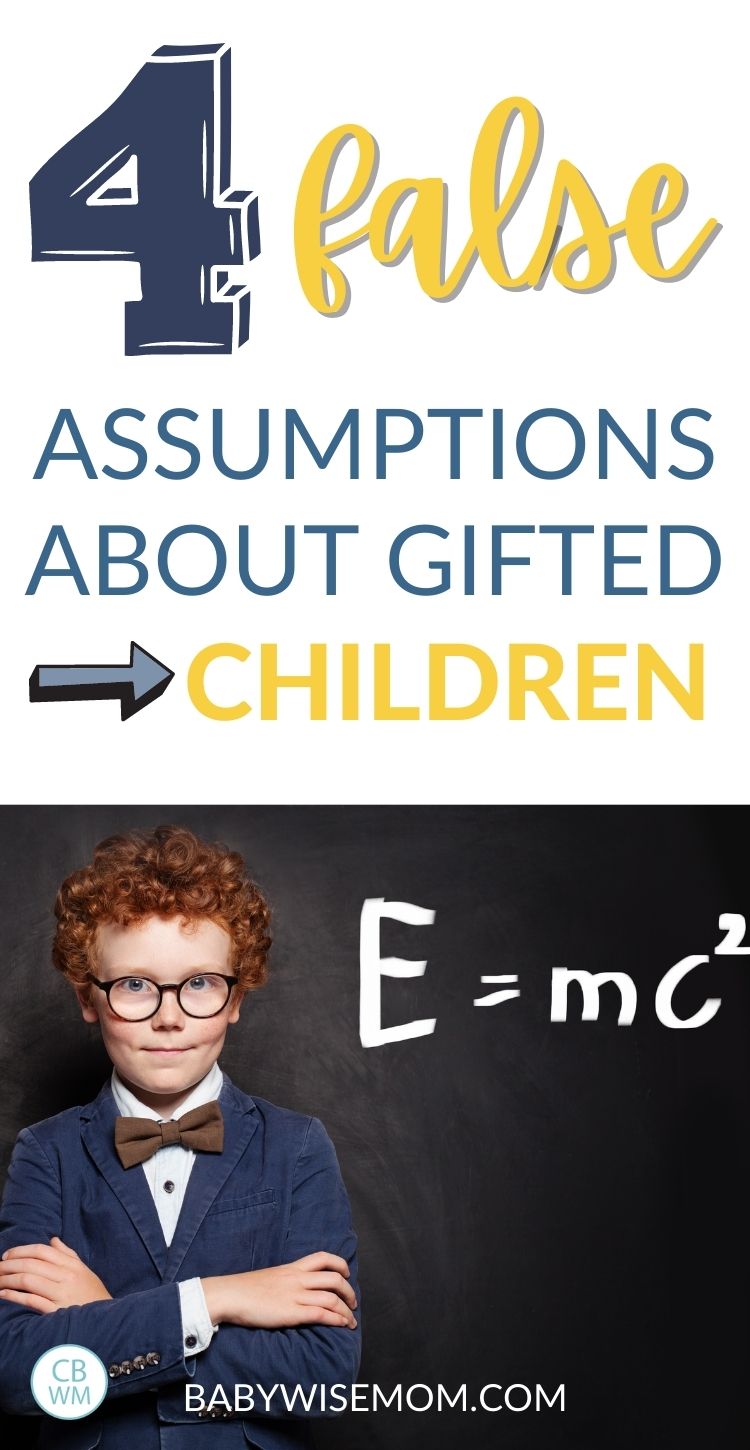There are many false assumptions about what gifted children are like and what support they do or do not need. Find four common ones here.

When it comes to any type of perceived strength or weakness or any type of life experience, it is difficult to actually understand what it is like without having someone close to you have that quality or experience.
When you find out someone close to you is gifted, you might have some common false assumptions. This post will address four very common assumptions about gifted children and talk about what is true. This will help you best support the gifted child in your life.
Post Contents
Raising Gifted Children is Easy
Many people assume raising a gifted child is quite easy. They assume gifted children do not face difficulties in life since they are intellectually advanced in many ways.
They even assume gifted children will never have poor academic achievement, social issues, or participate in risky behaviors.
A gifted child is no easier to raise than any other child. Any intense quality or trait a person has will bring with it pros and cons, and giftedness is no different.
Something to always remember with a gifted person is that when a kid is advanced in one skill, that means they are behind in another.
Think of it like when a baby is working on a new skill. When a baby is super advanced in fine motor skills, you often find there is some lack of development on gross motor skills.
The brain and body can only focus so much on development. If a child is advanced in one area, there are areas where he is also behind.
Gifted Children Will Always Figure Out a Way to Learn
A big false assumption is that a gifted child will never struggle in school. In fact, if the day comes a gifted child does struggle in school, the assumption then jumps to “Oh, he must not have really been gifted then.”
“…it is assumed…there is no need for specialized academic programs or teacher education in the field of giftedness.”
Emotional Intensity in Gifted Children, page 5
Despite common belief, gifted children need just as much support academically as any other child.
“…at least 5% of gifted children fail or drop out of school.” Emotional Intensity in Gifted Children, page 5
If school was a simple piece of cake for gifted children, that number would be lower.
Gifted children are often given little to no support or focus in school because they “shouldn’t need it.” Because they learn quickly and already know much of what is covered in early grades, they do not get the focus.
It is understandable. Teachers are overworked with large class sizes. They have students who are struggling to understand what is being taught and the focus goes there.
But that doesn’t change the fact that it hurts many gifted children academically.
Many children end up frustrated with school because it is mundane and repetitive. A math lesson takes 30 minutes longer than they need it to.
These children will often withdraw from class and learning because it is not enjoyable. This starts a bad habit that eventually hurts them. They won’t stay ahead forever, and at some point, the material catches up to them.
They then struggle to learn it because they haven’t ever had to work to learn. While teachers expect to have to be patient and work with a struggling student in the young grades, they don’t expect to have to teach a middle or high grade student how to learn. The assumption is the child is lazy or unwilling to participate.
Gifted students need to be challenged in some way to keep them engaged and interested in the learning process. They need to be challenged early in life so they learn to overcome hard things and they learn how to learn.
Some simple strategies my kids’ teachers have utilized include having them be peer tutors and simply allowing them to either go ahead or read a book when they already understand the material.
My kids have also been able to participate in a gifted class in elementary school. It is only once a week for one hour, but it helps.
I have made a concerted effort to sign them up for extracurricular activities that would challenge them mentally and physically so they would learn to push through hard things.
As they move into middle school and high school, honors classes, AP classes, and concurrent enrollment classes help. Unfortunately in our area, honors classes in the middle school are being cut more and more.
If you have a gifted child, do not assume there will not be or should not be any struggles academically.
If your gifted child is struggling academically, work with the teacher to find solutions that are acceptable in his/her classroom.
Gifted Children Have No Trouble Socially OR Struggle Socially
There are two common misconceptions when it comes to the social life of gifted children. They are two extremes.
One is that gifted children never struggle socially and the other is that they will definitely struggle socially.
Either can be true, and neither can be true.
Gifted children are intense. They see the world differently.
They can come across as arrogant and can struggle to connect with their peers. They typically have vastly different interests and concerns than a child their age.
So they definitely can struggle to connect with others.
But there are gifted children who are gifted socially and fit in just fine.
As a parent of a gifted child, you want to be aware of a few things socially.
One is that sometimes gifted children start to hide their giftedness in order to fit in or be cool–especially in middle school.
I distinctly remember a girl in my grade who was brilliant who suddenly started to pretend she was very ditzy. Her grades dropped and she stopped taking honors classes.
Another thing to know is that gifted children rarely feel safe and secure because they just don’t fully relate to their peers. They struggle to really connect to someone in a meaningful way.
Gifted children can be bullied.
Gifted kids are often told by adults they need to change things about themselves so they can fit in better with peers.
While there are things gifted kids can benefit from being explicitly taught, it is helpful for your narrative to allow children to embrace who they are. They can learn and grow without having to hide themselves.
>>>Read: How To Teach a Gifted Child Communication Skills
Gifted Children are More Prone to Anxiety or Depression
Many people assume that gifted children are more prone to anxiety or depression. In reality, they are actually found to be more resilient.
Many gifted children are typically more emotionally intense than their average peers, so they can come across as anxious or depressed. Looking at these behaviors, well-meaning adults can try to address anxiety and depression that aren’t actually present.
It is best to focus on social-emotional development, emotional awareness, and the development of coping strategies.
Conclusion
If you have a gifted child, be aware of these four common assumptions and make sure you do not slip into them. If you feel like this list is something you could use help with, be sure to read the book Emotional Intensity in Gifted Students: Helping Kids Cope with Explosive Feelings by Christine Fonseca.
Relate Posts
- Emotional Intensity in Gifted Students Book Review
- 15 Common Characteristics of Gifted Children
- Extroverts and Introverts: How it Affects Giftedness

